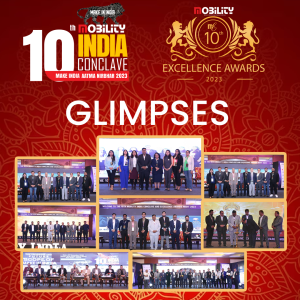As a leading IoT provider, Bosch offers innovative solutions for smart homes, Industry 4.0, and connected mobility. Bosch is pursuing a vision of mobility that is sustainable, safe, and exciting. It uses its expertise in sensor technology, software, and services, as well as its own IoT cloud, to offer its customers connected, cross-domain solutions from a single source.

During an exclusive interaction with Mobility magazine, Mr. RK Shenoy, Senior VP — Mobility Engineering at Bosch Global Software Technologies, details about the brand’s innovation, its R&D and the scope of Make in India along with the future roadmap.
1. R&D is enabling a shift in GCCs from engineering support to product ownership. Request you to please elaborate
Over the years, the engineering GCCs in India have gained maturity and are evolving from being “single-function to multi-function centers and “delivery focused” to “business-focused”. This has corresponded with the digital disruptions thereby changing the shape of the global business landscape. Additionally, the GCCs are becoming a competitive advantage for the enterprises by creating global products and service lines and creating new revenue channels through IP creation. The council also has institutionalized an annual Engineering & Innovation Excellence awards program that had been set up to benchmark peers driving exponential value to the HQ. This council conducts peer-led immersive sessions which will enable knowledge and best practice sharing among Indian GCCS and ESPs which will help GCCs in driving significant value to the parent organization.
2. How does Bosch Global Software Technologies catapult innovation?
At BGSW, we are constantly striving to bring the best technology-led innovations to businesses across the globe. Innovation is a very important lever for any software company to remain relevant and we aim to leverage innovation as a driver of the ‘Fit-For-Future’ companies by establishing itself as a leader firstly in Software Engineering Excellence and secondly in Software led products and services for both Bosch business and non-Bosch business. Our strategy to achieve this goal is based on building a strong Innovation culture in the organization through its 20,000 associates, developing new age technology competencies and expert communities and engaging in value-driven ecosystem partnerships.
Furthermore, the success of BGSW’s innovation strategy is majorly dependent on its associates’ contribution to it. Enterprises need to empower their associates to think creatively apart from focusing on the operational aspects. Also, we are working on many initiatives that promote an environment where innovative ideas can be nurtured.
An Innovation investment Fund of 0.7% BGSW revenue has been created to enable new ideas (product/asset, performance, and competency) and provide them with seed funding. An easy-to-follow investment process has also been defined as part of it. We have established an ongoing space/garage for innovation teams to work in with state-of-the-art infrastructure
3. Explain the innovations that happen at the R&D center in India?
At Bosch, we give equal importance to innovation and business that are relevant for both global as well as emerging markets including India across all domains. Innovations that are “invented for life” have been the driving force for us. In India, we have teams that operate at all parts of the innovation value chain. We have a corporate research lab that focuses on applied research and has advanced the state of the art in technologies, business incubators addressing new market opportunities, and of course, R&D teams that engineer, industrialize and scale products/solutions for existing and new markets.
In the mobility space, we see trends of PACE (Personalized, Automated, Connected & Electrified), which is driving innovation. Our engineers are developing solutions/platforms for the globe as well as India-specific ones, keeping the market segment in mind. Some of the examples are iTraMS in connectivity space, ABS and Engine ECU for 2 wheelers, Driver assistance systems based on Video & Radar for passenger cars, and Vehicle Control Units for commercial vehicles to name a few. We were very successful in market acquisition due to the cost-effective and frugal development of the electronic control units for all types of powertrains during the transition of India from BS4 to BS6 norms. Currently, we are also working on systems for electrified solutions for 2W and passenger cars.
Beyond mobility, we have developed AI-based solutions like Hemoglobin monitoring in healthcare and Phantom for Energy management, which got several innovation awards including CES and NASSCOM.
4. Give your inputs on Make in India with respect to Bosch?
With technological advances disrupting businesses across industries, enterprises must encourage innovation internally to keep up with market changes. It is imperative for companies to encourage employees to be entrepreneurial. With an installed talent of more than a million in GCCs in India, BGSW has cultivated a very important footprint in the world R&D landscape. While the advantages of arbitrage are diminishing the ability to master the latest technologies and scale up the operations, it’s a key factor for the R&D operations in India. With most people having moved to working virtually, global development has become a level laying world, and this has accelerated the shifting of complete programs to India. Additionally, we are also supporting the start-up ecosystem by engaging with them and supporting them via our DNA Nxt programs which have also resulted in investing and collaborating in our R&D eco-system.
BOX ITEM
While the advantages of arbitrage are diminishing the ability to master the latest technologies and scale up the operations, it’s a key factor for the R&D operations in India.
If you have an interesting Article / Report/case study to share, please get in touch with us at editors@roymediative.com/ roy@roymediative.com, 9811346846/9625243429.






